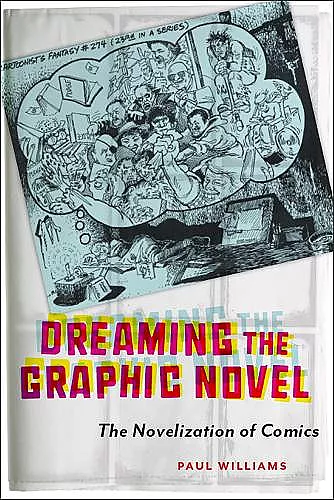Dreaming the Graphic Novel
The Novelization of Comics
Format:Hardback
Publisher:Rutgers University Press
Published:17th Jan '20
Currently unavailable, and unfortunately no date known when it will be back

Winner of the Best Book Award in Comics History from the Grand Comics Database
Honorable Mention, 2019-2020 Research Society for American Periodicals Book Prize
The term “graphic novel” was first coined in 1964, but it wouldn’t be broadly used until the 1980s, when graphic novels such as Watchmen and Maus achieved commercial success and critical acclaim. What happened in the intervening years, after the graphic novel was conceptualized yet before it was widely recognized?
Dreaming the Graphic Novel examines how notions of the graphic novel began to coalesce in the 1970s, a time of great change for American comics, with declining sales of mainstream periodicals, the arrival of specialty comics stores, and (at least initially) a thriving underground comix scene. Surveying the eclectic array of long comics narratives that emerged from this fertile period, Paul Williams investigates many texts that have fallen out of graphic novel history. As he demonstrates, the question of what makes a text a ‘graphic novel’ was the subject of fierce debate among fans, creators, and publishers, inspiring arguments about the literariness of comics that are still taking place among scholars today.
Unearthing a treasure trove of fanzines, adverts, and unpublished letters, Dreaming the Graphic Novel gives readers an exciting inside look at a pivotal moment in the art form’s development.
Review of Dreaming the Graphic Novel in Medienwissenschaft 01/2021— Medienwissenschaft
"Dreaming the Graphic Novel undertakes the very important task of deepening our understanding of the origins of book format comics and giving a historical context to the anxieties around comics and graphic novels in the 2000s."— European Journal of American Culture
"Dreaming the Graphic Novel is a methodological wonder for scholars interested in American popular culture, digital humanities, text mining, and the history of comics and graphic novels. His mixed methodological approach allows him to successfully participate in 'the ongoing recovery of comics studies’ prehistory' as well as establish 'a new way of doing graphic novel history.' Williams’ book should be a required reading...for courses offering an introduction to graphic novels in the U.S. Comics fans, comics scholars, and those interested in the history of graphic novel might also find this a stimulating read."— ImageTexT
"There is much to recommend in Williams’ examples of, and conversation around, long-form comics of the period provided throughout the book....An excellent corrective to the scatter-shot references one usually encounters [that] succeeds in correcting some long-standing misconceptions about the development of the graphic novel."— Inks
"Accessible and detailed, Williams’s study expands on previous scholarship on the evolution of comics into graphic narratives. Highly recommended."— Choice
"A thoughtful and engaging exploration of the complex disagreements and debates over the term, form and temporality of the 'graphic novel.'"— Mel Gibson, editor of Superheroes and Identities
"As Williams’ detailed scholarship shows, efforts by major creators like Corben, Will Eisner, and Art Spiegelman secured academic and cultural legitimacy for the graphic novel while ensuring, through their newly integrative approach, a differential art recognized for its aesthetic seriousness yet independent of institutional strictures."— Technical Communication Journal
"The 1970s are one of the most under-appreciated periods in the history of comic books. As sales collapsed, comic book publishers grasped at any innovation that offered a potential road forward. Paul Williams’s masterful study focuses on this chaotic period as it traces the complex ways that catastrophic change spurred a fundamental reconsideration of what comic books were and could be. Drawing on a vast array of historical documents, Williams shows how the graphic novel became the cultural format of our time."— Bart Beaty, author of The Greatest Comic Book of All Time
ISBN: 9781978805071
Dimensions: 229mm x 152mm x 20mm
Weight: 513g
278 pages